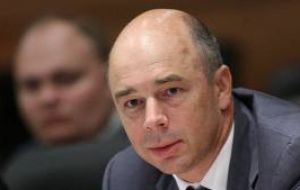MercoPress. South Atlantic News Agency
G-20 Finance ministers to discuss effects of monetary stimuli and currency values
 Russia Finance minister Siluanov and host of the meeting: no set targets for exchange rates of their currencies.
Russia Finance minister Siluanov and host of the meeting: no set targets for exchange rates of their currencies. The finance ministers of the G20 group of nations are meeting in Moscow amid concerns that major trading powers may be heading towards a currency war. Japan's monetary stance has seen a big decline in the Yen, while the Euro has risen against a basket of currencies.
The value of a country's currency has a big impact on its trade and there are fears nations may try to influence markets to help boost their economies. The G20 has previously asked nations to refrain from market intervention.
Earlier this week, the G7 group of nations issued a statement saying they would not set targets for exchange rates of their currencies.
On Thursday, Anton Siluanov, finance minister of Russia, the host of the G20 meeting, said it, too, was likely to issue a similar communiqué.
The meeting comes at a time when some of the world's biggest economies and regions are still struggling to spur economic growth.
Figures released on Thursday showed that, Japan, the world third-largest economy, remains in recession. Its GDP shrank 0.1% in the three months to the end of December, from the previous three months, the third straight quarter of contraction.
Meanwhile, the Euro zone recession also deepened in the final three months of 2012.
This has led to fears that countries that continue to struggle may try to devalue their currencies in order to trigger growth.
A weak currency makes goods from a country, or region, in the case of Euro zone cheaper to foreign buyers and also boosts profits of firms when they repatriate their foreign earnings back home.
The fears have been stoked further by the recent movements of the Yen and the Euro, as well as by comments made by some senior leaders.
The Yen has weakened more than 15% against the US dollar since November last year, after Japan took an aggressive monetary stance to try and stoke inflation and expanded a key stimulus measure.
Ahead of the G20 meeting, the Bank of Japan (BOJ) Governor Masaaki Shirakawa said the central bank will continue to ease policy in the future.
“The BOJ is conducting monetary policy to achieve stability in Japan's economy. It will continue to do so,” he said. However, some analysts said that Japan was not moving to deliberately weaken its currency.
Meanwhile, the Euro has risen by 6% against a basket of other currencies in the past six months.
At a meeting of Euro zone ministers, French Finance Minister Pierre Moscovici said he was worried that the rising single currency is making the region's goods less competitive.
The European Central Bank president Mario Draghi was also deemed to be trying to talk down the euro at his press conference following the bank's latest rate decision.
However, the International Monetary Fund (IMF) said that countries had been easing their policies to try and revive growth and that it did not see any threat of competitive currency devaluation for now.




Top Comments
Disclaimer & comment rules-

-

-

Read all commentsI wouldn't get too comfortable in that seat Argentina, this may be your last G20 summit.
Feb 15th, 2013 - 06:44 am 0I fail to see what contribution they could make to this forum.
Feb 15th, 2013 - 09:02 am 0Were they there?
Feb 15th, 2013 - 02:27 pm 0Commenting for this story is now closed.
If you have a Facebook account, become a fan and comment on our Facebook Page!